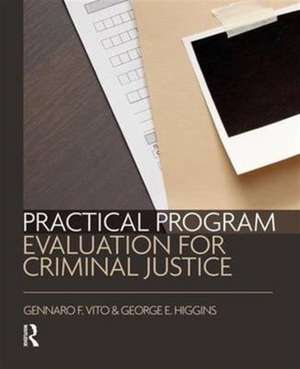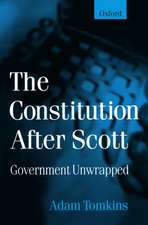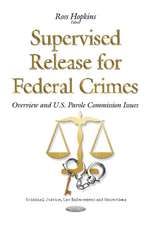Practical Program Evaluation for Criminal Justice
Autor Gennaro Vito, George Higginsen Limba Engleză Hardback – 4 ian 2016
| Toate formatele și edițiile | Preț | Express |
|---|---|---|
| Paperback (1) | 350.43 lei 43-57 zile | |
| Taylor & Francis – 10 iun 2014 | 350.43 lei 43-57 zile | |
| Hardback (1) | 875.55 lei 43-57 zile | |
| Taylor & Francis – 4 ian 2016 | 875.55 lei 43-57 zile |
Preț: 875.55 lei
Preț vechi: 1324.13 lei
-34% Nou
Puncte Express: 1313
Preț estimativ în valută:
167.54€ • 175.36$ • 139.44£
167.54€ • 175.36$ • 139.44£
Carte tipărită la comandă
Livrare economică 31 martie-14 aprilie
Preluare comenzi: 021 569.72.76
Specificații
ISBN-13: 9781138137844
ISBN-10: 1138137847
Pagini: 178
Dimensiuni: 191 x 235 mm
Greutate: 0.45 kg
Ediția:1
Editura: Taylor & Francis
Colecția Routledge
Locul publicării:Oxford, United Kingdom
ISBN-10: 1138137847
Pagini: 178
Dimensiuni: 191 x 235 mm
Greutate: 0.45 kg
Ediția:1
Editura: Taylor & Francis
Colecția Routledge
Locul publicării:Oxford, United Kingdom
Cuprins
Chapter 1: Getting Started with Program Evaluation Chapter 2 : Planning a Program Evaluation Chapter 3 : Needs Assessment Evaluation Chapter 4 : Theory-Driven Evaluation Chapter 5 : Process Evaluation Chapter 6 : Outcome Evaluation Chapter 7 : Cost Efficiency Evaluations Chapter 8 : Measurement and Data Analysis Chapter 9 : Reporting and Using Evaluations Chapter 10 : Looking Ahead: A Call to Action in Evaluation Research
Notă biografică
Gennaro F. Vito is a Distinguished University Scholar and professor in the Department of Justice Administration at the University of Louisville, where he has a faculty appointment in the Administrative Officer’s Course of the Southern Police Institute. He holds a Ph.D. in public administration from The Ohio State University. He is a past President and Fellow of the Academy of Criminal Justice Sciences and received its Bruce Smith Sr. Award in 2012. His research interests are concerned with criminal justice policy analysis and program evaluation and police management.
Recenzii
"Overall, I have little doubt that this particular text will be well-received by all as it is clearly successful in delivering on its proposed purpose and goals. The text is well-written and concise, yet at the same time authoritative and illustrative in its examples. In addition, the text is written in a manner that makes it largely accessible and useful for a wide array of audiences including academics, researchers, and practitioners as well as undergraduate and graduate students. It should definitely be on the shelf, or better yet on the desk and always open, for any and all of those who want to become versed and ultimately experts in program evaluation in criminology and criminal justice." — Wesley G. Jennings, Ph.D., University of South Florida
Descriere
When closely examined, many of the most prominent criminal justice policies to emerge over the last 30 years are found wanting. According to Bureau of Justice Statistics, today’s prisons now house 700% more inmates than in 1980 at 1700% the cost. What’s more, 62% of ex-offenders are re-arrested, and 41% re-imprisoned. Such high rates of incarceration and recidivism reflect just how flawed contemporary crime prevention approaches really are. It’s becoming increasingly clear that policy need not just be executed , but properly evaluated . During this period of economic uncertainty, it’s more imperative than ever that we are able to apply the principles of fiscal responsibility, accountability, and evidence-based practice to criminal justice reform plans. Practical Program Evaluation For Criminal Justice teaches students to do just that – thus endowing them with an increasingly important skill to be used in the workplace. Unlike other policy-based texts (which tend to focus more on implementation than assessment), it provides applicable, step-by-step instruction on how to determine whether an initiative is truly necessary prior to its adoption (thus eliminating the risk of wasting resources), as well as how to accurately gauge its effectiveness during initial roll-out stages. This is achieved through the gradual introduction of basic data analysis procedures and statistical techniques, which, once mastered, can prove or disprove a program’s worth. Lastly, the book’s penultimate chapter introduces students to the types of stakeholders to whom evaluation results should first be relayed if quick action is needed, as well as how to best structure reports to ensure their buy-in.

























